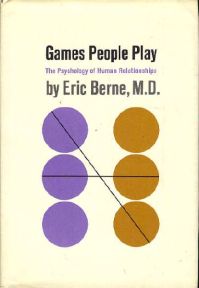 A seminal, very useful book is turning 50 this coming year. Published in 1964, and the best selling non-fiction book of the 1960s, Games People Play by Dr. Eric Berne introduced Transactional Analysis, which looked closely at human relationships. He opted to study interaction as transaction, since he said we communicate to get something out of it.
A seminal, very useful book is turning 50 this coming year. Published in 1964, and the best selling non-fiction book of the 1960s, Games People Play by Dr. Eric Berne introduced Transactional Analysis, which looked closely at human relationships. He opted to study interaction as transaction, since he said we communicate to get something out of it.
For example, if one person says hello, and the other person doesn’t respond, the first person feels cheated or irritated, since he or she expected to get something out of saying hello.
Berne said we communicate in three ego states, as the parent, the child and the adult. Everybody has these three people inside their head, which explains the mental cacophony we sometimes experience. When we are emotional, we are the child. Supportive or exerting power over others, we are the parent. Acting rationally, and focusing on the objective problems at hand, we are the adult. And the obvious way to go is to be the adult. This still comes across as fresh to me. It’s good, solid, everyday advice, the very basis of Emotional Intelligence, i.e. applying reason to how we engage in social situations with others.
Berne identified six different ways in which people communicate:
- withdrawal (disengagement)
- rituals (highly standardized exchanges)
- pastimes (predictable conversations, polite exchanges of opinions)
- activities (eg doing math or building something together)
- games (underhanded, exploiting others)
- intimacy (a game-free relationship)
The games we play, he says, like “If it weren’t for you”, are all rackets. Anger is one of those rackets, he says. It makes you feel righteous for a while, but doesn’t solve anything. Instead he says we have to decide to look at what is making us angry and think about why the other person is doing it. That means not letting the other person win the game by allowing ourselves to get angry. It’s an interesting and engaging challenge, and one that can actually improve the situation.
Every game has three parts:
- the con – the way of cheating used
- the gimmick – the weakness that makes the other person play the game
- the payoff – the feeling that people get from playing the game
Among the aspects Berne identified as worthy of therapy are scripts that he said we develop and follow early in life, and can for instance recognize in fairy tales.
Below is a wonderful 1966 NET Science broadcast special on the book. The reporter interviews Dr. Berne at his home in Carmel where the author explains the theory behind Transactional Analysis. The camera then follows the two of them along the gorgeous Carmel coast – where incidentally Helmut and I spent almost a week last summer. And finally we see Dr. Berne in with other California psychologists, Swinging Sixties style. Watch these four short videos for an exquisite introduction to the theory, and take an evocative journey into the epoch when Transactional Analysis was still new.
Eric Berne passed away in 1970. A website dedicated to him contains selected games he identified. See if any of them ring a bell with you. They did with me. ‘Uproar’, with slamming doors, is a game I used to play a lot with my dad when I was a trouble-making teen. And I find it quite sobering to recognize that I still like to indulge the Child in me.
On this note: I want a sun umbrella just like Dr. Bearne’s.
http://www.ericberne.com/games-people-play/




3 Responses
oh the games people play now, every night and every day now, never saying what they mean now, never meaning what they say….
Everything goooood is 5Oish.
Joe South (1968). ‘People walking up to you singing Glory Hallelujah, then they try and sock it to you in the name of the Lord.’
And now the Cajun original, ‘Tit Galop Pour Mamou